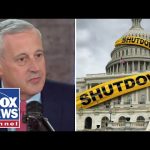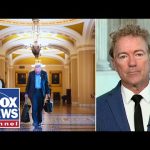The current government shutdown marks yet another episode in the ongoing battle over fiscal responsibility and the size of government, with Republicans firmly placing the blame on Democratic Senate Leader Chuck Schumer. Senators Markwayne Mullin and Mike Lee have been vocal in condemning the shutdown as a product of Democratic obstructionism, dubbing it the “Schumer shutdown.” They argue that Democrats are deliberately stalling progress with excessive demands, particularly advocating for maintaining illegal subsidies and pushing a massive spending package rather than embracing necessary budget reforms. This shutdown decision reflects a deep-seated resistance from the left to abandon their expansive agenda, disregarding the fiscal consequences for ordinary Americans.
The heart of the conflict lies in Republicans’ insistence on cutting government waste and opposing subsidies that many believe unfairly benefit illegal immigrants. Mullin recalls the hard-fought battles Republicans have won to protect taxpayer dollars from being misused and fraudulently distributed. Yet Democrats are actively trying to reverse these gains, insisting on funding bills that ignore fiscal prudence. Instead of focusing on genuine solutions, Democrats prefer a shutdown at the expense of the American people, showing a blatant disregard for economic stability. This partisan theater exposes the Democrats’ failure to govern responsibly and their preference for using government shutdowns as political leverage.
From a broader viewpoint, this standoff represents more than just a legislative impasse; it exemplifies the public’s growing rejection of the Democratic agenda. Republicans rightly emphasize that voters have expressed dissatisfaction with Democratic policies at the ballot box, but the party refuses to course-correct. Rather than consenting to compromise, Democrats double down, using the shutdown to deflect blame and escalate the crisis. Mullin’s metaphor of Democrats as arsonists setting a fire only to film themselves calling the fire department starkly captures this self-destructive political spectacle, where the party seeks to undermine government functioning while avoiding accountability.
President Trump’s role amid this crisis is pivotal. The shutdown shifts considerable authority to the White House to categorize federal employees as essential or nonessential, vesting Trump with considerable leverage to streamline the federal workforce. This reflects a necessary but overdue reassessment of the bloated government bureaucracy, highlighted by Senator Lee’s point on the large number of nonessential federal employees. The shutdown could serve as a wake-up call to rethink government operations and prioritize efficiency over expansion. The president’s willingness to confront entrenched bureaucratic waste and inefficiency is a bold step toward restoring fiscal discipline in Washington.
Finally, while the rhetoric surrounding the shutdown is heated, the reality is that the stakes are high for millions of federal workers and military personnel awaiting their paychecks. Both parties will need to navigate this turbulent standoff carefully, as the consequences of prolonged shutdowns can ripple across the nation. Yet the responsibility for this crisis rests squarely with the Democrats, who refuse to compromise and instead weaponize government dysfunction for political gain. Until sanity returns to Capitol Hill with a genuine commitment to fiscal responsibility, American taxpayers will continue to suffer under the weight of Washington’s political gamesmanship.




